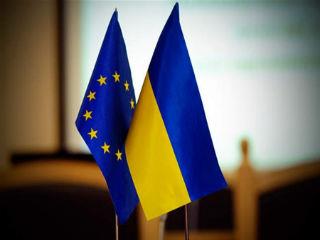Opposition Ukrainian MPs have called for more awareness of human rights abuses in the war-torn country. The five-strong delegation was in Brussels on Monday for a series of meetings with MEPs and representatives from the European Commission.

The visit comes ahead of a summit of EU leaders, who meet in Brussels on Thursday and Friday to discuss Ukraine.
by
Martin Banks
The visit comes
ahead of a summit of EU leaders, who meet in Brussels on Thursday and Friday to
discuss Ukraine.
The five
parliamentarians are members of the "The Opposition Bloc", political
force formed in November by six political parties that took part in Ukrainian
parliamentary elections last year when the party won 9.43% (1,486,203 votes),
29 seats and took fourth place.
"The Opposition
Bloc" led in five regions: Dnipropetrovsk, Donetsk, Zaporozhye, Lugansk
and Kharkiv.Recent polls
suggest that since parliamentary elections last year, their popularity has
increased further.
In the 450-seat Ukraine Parliament it currently has 40
MPs,mostly from the Donbass region of the country. Speaking on Monday
in the European Parliament, Ukraine MP Julia Lyovochkina, a member of the
delegation, said she hopes the visit will contribute to finding a peaceful
solution to the ongoing crisis in Ukraine.
She said, "We
are saying that while sanctions against Russia should remain there also has to
be more effective and substantial dialogue between all the parties involved in
this conflict."
The MPs say they
are keen to also raise issues of particular concern to "under
represented" people living in the Donbass region, the area in south east
Ukraine which is mostly badly affected by the fighting, who did not participate
in the elections in 2014.
The delegation
also consists of Yuriy Boyko, a former deputy Prime Minister of Ukraine an
ex-minister of fuel and energy of Ukraine, and Oleksandr Vilkul, also a former
vice Prime Minister and ex-chairman of the Dnipropetrovsk Regional State
Administration.
They were
accompanied by Vadim Rabinovich, chairman of the political party
"Center" and president of the All-Ukrainian Jewish Congress.
The aim of the two
day visit is essentially to discuss the state of democracy and human rights in
Ukraine with their counterparts in the European Parliament and play an
"active and constructive" role for a peaceful solution in the
country.
The delegation, in
particular, wants to raise more awareness in Europe about human rights abuses,
such as those suffering by the estimated 1.2m "internally displaced
people", both Russian and Ukrainian speakers, currently suffering hardship
in several areas, including housing.People in living
in so called "conflict zones" have become victims of "non
delivery" of basic public services, such as banking and education.
Another group suffering
a similar plight are those in Crimea whose rights to freedom of assembly and
speech have been disregarded.
The delegation
says that the media in Ukraine is also suffering an attack on the freedom of
speech with some journalists imprisoned for attacking government policy.
Opposition parties
have, according to the delegation, been targeted with their traditional right
to chairmanships and other senior roles in the Ukraine parliament being denied
since elections last October.
"These are
all topics which we want to raise in our discussions in Brussels this
week," said Lyovochkina who herself was briefly threatened with
prosecution for alleged "treason" after she expressed her concerns in
a speech at the Parliamentary Assembly of the Council of Europe in January.
She said, "I
was amazed that someone could be treated in such a way in contemporary
Ukraine."Rabinovych, who
chairs the sub committee on human rights in the Ukraine parliament, said there
was a long standing issue of corruption and "mismanagement" in
Ukraine and he called on the EU to make financial aid to Kiev conditionally
upon effective internal reform.
He said, "The
member states of the EU are providing billions of euros to Ukraine and we are
saying that delivery of this should be directly linked to closer scrutiny of
the authorities in Ukraine".
"The Ukraine
currency has devalued three times in recent times and it is now the poorest
country in Europe. The EU has to put more pressure on the government and
authorities in Ukraine to be more accountable."
The five MPs will
meet senior MEPs during their visit, including Charles Tannock, ECR foreign
affairs spokesman, Greens co leader Rebecca Harms, German GUE deputy Sabine
Losing, deputy chair of the security and foreign affairs committee, and Petras
Austrevicius, deputy leader of the Alde group.
A meeting with
Emma Udwin, deputy head of cabinet for EU enlargement commissioner Johannes
Hahn, is also scheduled before the group returns to Kiev.
Their visit to
Brussels comes in the wake of calls by Germany and other countries for European
Union leaders to this week endorse a declaration saying that EU sanctions on
Russia will not be eased unless Moscow complies with a Ukraine ceasefire deal.
On Monday, European Council President Donald Tusk said the EU must not
compromise with Russia over sanctions in response to the Ukraine crisis.
Under the
ceasefire reached in Minsk in February both sides in the Ukraine conflict were
due to pull back heavy weapons by the beginning of March.
The two sides are
due to create a buffer zone between them of at least 50km for artillery of
100mm calibre or more, 70km for multiple rocket systems and 140km for the
heaviest rockets and missiles.




 By: N. Peter Kramer
By: N. Peter Kramer
